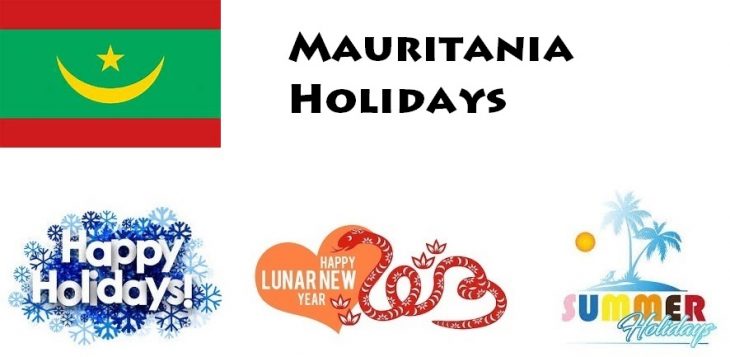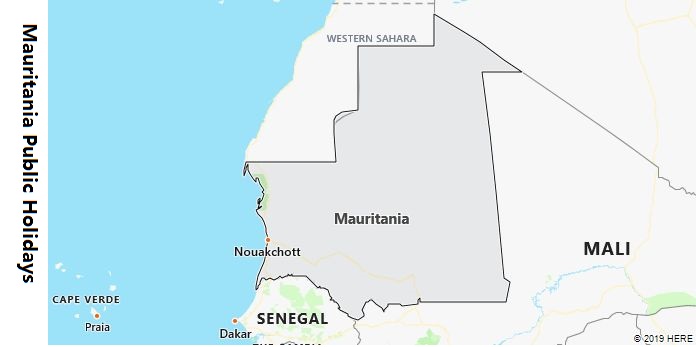Mauritania Public Holidays
Mauritania Public Holidays
Searching for the national holidays in Mauritania? All public holidays in Mauritania are treated like Sundays. This means that most of the Mauritania employees have a day off and all schools are closed on these office holidays. If you are planning a trip to Mauritania and want to know what the national and regional holidays are, check the details in the tables below.
Mauritania, located in West Africa, is a nation steeped in Islamic tradition and history. Public holidays in Mauritania reflect the country’s deep-rooted religious practices, its independence from colonial rule, and its cultural identity. The public holidays are a mix of Islamic events based on the lunar calendar and significant national celebrations that honor the country’s independence and progress.
Religious Holidays
As an Islamic Republic, Mauritania follows the Islamic (Hijri) calendar for many of its holidays. These religious holidays are observed by Muslims across the country and are central to the spiritual and communal life of the people. Since the Islamic calendar is lunar, the dates of these holidays shift each year by about 10 to 11 days in the Gregorian calendar.
Eid al-Fitr (End of Ramadan)
- Date: First day of Shawwal (10th month of the Islamic calendar), following the conclusion of Ramadan
- Significance: Marks the end of Ramadan, a month of fasting, prayer, and reflection for Muslims.
- Traditions:
- The day begins with special prayers called Salat al-Eid, held in large congregations at mosques and open spaces.
- Families come together for a festive meal to break the month-long fast, often featuring traditional dishes.
- Charity, known as Zakat al-Fitr, is an essential part of Eid, with donations made to the poor so that they can participate in the celebrations.
- People dress in new or special clothing, and visits to friends and family are customary.
Eid al-Adha (Feast of Sacrifice)
- Date: 10th of Dhu al-Hijjah (the final month of the Islamic calendar)
- Significance: Commemorates the willingness of Prophet Ibrahim (Abraham) to sacrifice his son in obedience to God’s command, before God provided a ram to be sacrificed instead.
- Traditions:
- A major feature of this holiday is the ritual sacrifice of an animal, usually a sheep or goat, in remembrance of the story of Ibrahim. The meat is distributed among family, friends, and those in need.
- Like Eid al-Fitr, the day begins with communal prayers at mosques and open spaces.
- It is a time for family gatherings, sharing meals, and reinforcing community bonds.
- Many families also give generously to the poor and support charitable causes during Eid al-Adha.
Islamic New Year (Hijri New Year)
- Date: 1st of Muharram (the first month of the Islamic calendar)
- Significance: Commemorates the migration (Hijra) of Prophet Muhammad and his followers from Mecca to Medina, marking the beginning of the Islamic calendar.
- Traditions:
- Though the Islamic New Year is a quieter holiday compared to Eid celebrations, it is a time for reflection and prayer.
- Families may visit the mosque for special prayers, and discussions about the life of the Prophet Muhammad and the significance of the Hijra often take place.
- Some people choose to fast on this day as a form of devotion and reflection.
Prophet Muhammad’s Birthday (Mawlid al-Nabi)
- Date: 12th of Rabi’ al-Awwal (the third month of the Islamic calendar)
- Significance: Celebrates the birth of Prophet Muhammad, the central figure of Islam.
- Traditions:
- Mosques hold special services where the life and teachings of the Prophet are discussed, with sermons and recitations of the Quran.
- It is a time for personal reflection on the Prophet’s virtues, and in some communities, processions or public gatherings may be organized to mark the occasion.
- Families share meals together, and acts of charity are encouraged, reinforcing the values of compassion and generosity associated with the Prophet.
National Holidays
Mauritania’s national holidays highlight key moments in the country’s history, particularly its struggle for independence from colonial rule and the establishment of its republican system. These holidays are marked by official ceremonies, national pride, and celebrations across the country.
Independence Day
- Date: November 28
- Significance: Commemorates Mauritania’s independence from French colonial rule in 1960.
- Traditions:
- The day is marked with grand official ceremonies, including speeches by government officials, military parades, and the hoisting of the national flag.
- Independence Day is celebrated with pride across the country, with cultural events, music, and public gatherings.
- Schools, businesses, and government offices are closed, and people take time to reflect on the country’s journey toward sovereignty and the challenges faced since independence.
Labor Day (International Workers’ Day)
- Date: May 1
- Significance: Recognized globally, this day honors the contributions of workers and the labor movement in Mauritania.
- Traditions:
- Labor unions and workers’ organizations often hold public demonstrations, meetings, or rallies to discuss workers’ rights and advocate for better working conditions.
- Government offices and businesses typically close for the day, and many people take the opportunity to rest and spend time with family.
- It is a day for reflecting on labor laws, progress in workers’ rights, and economic challenges within the country.
Africa Day
- Date: May 25
- Significance: Celebrates the founding of the Organization of African Unity (OAU), now known as the African Union (AU), and highlights the unity and progress of African nations.
- Traditions:
- Africa Day in Mauritania is marked by official speeches, cultural events, and discussions about pan-Africanism and solidarity among African nations.
- Educational institutions and government offices hold programs that emphasize the importance of cooperation and progress in Africa.
- It is a day for celebrating African heritage and the shared history and future of the continent.
Cultural and Regional Observances
While national and religious holidays dominate the calendar in Mauritania, certain regions and communities observe cultural or local events that reflect the country’s diverse heritage. These observances may not be official public holidays but are still significant in the cultural life of the country.
Traditional Festivals
In various parts of Mauritania, cultural festivals are held to celebrate regional traditions, music, and arts. These festivals often coincide with important agricultural or seasonal events and are deeply rooted in the history and customs of the local populations.
- Guetna Festival (Date Harvest Festival):
- Occurs during the date harvest season, typically in late summer.
- It is an important time in the agricultural calendar, especially in the oasis regions, where dates are a major crop.
- Families and communities come together to celebrate the bounty of the harvest with traditional music, dance, and feasts.
- Music and Cultural Festivals:
- Mauritania hosts several festivals that celebrate its rich heritage of music, oral poetry, and folklore.
- Festivals like the Festival of Ancient Cities and the Festival of Nomadism bring together performers and artists to celebrate Mauritania’s unique cultural identity.
- These festivals often include traditional music performances, storytelling, and exhibitions of crafts and local arts.
Observance and Public Participation
Government and Business Closures
- On major religious holidays like Eid al-Fitr and Eid al-Adha, most businesses, government offices, and schools are closed to allow people to observe the traditions and spend time with family.
- National holidays such as Independence Day and Labor Day are also observed with widespread closures of government institutions and businesses, allowing for public celebrations and events.
- Though Africa Day is not as widely celebrated as other national holidays, some government offices and educational institutions may close or hold special events in its observance.
Public Participation
- Religious holidays are central to life in Mauritania, with entire communities participating in mosque services, family gatherings, and charitable activities. Eid celebrations are particularly significant, bringing families and communities together in a spirit of unity and generosity.
- National holidays like Independence Day foster a sense of pride and national identity, with public parades, flag-raising ceremonies, and cultural events. These celebrations often bring people together to reflect on the country’s history and achievements.
Tourism and Visitor Experience
- Visitors to Mauritania during religious holidays like Eid al-Fitr and Eid al-Adha will find that businesses may be closed, but they may also have the opportunity to witness or participate in traditional celebrations.
- National holidays such as Independence Day provide a unique insight into the country’s history and political journey, with public events offering a chance to experience Mauritania’s sense of national pride.
- Festivals like the Guetna or regional cultural events offer travelers the opportunity to engage with local customs, taste traditional foods, and enjoy performances of Mauritania’s distinctive music and dance.















































